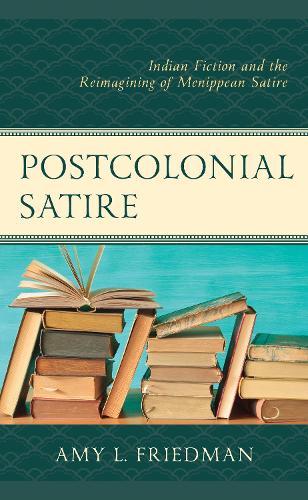
Postcolonial Satire: Indian Fiction and the Reimagining of Menippean Satire
(Hardback)
Publishing Details
Postcolonial Satire: Indian Fiction and the Reimagining of Menippean Satire
By (Author) Amy L. Friedman
Bloomsbury Publishing PLC
Lexington Books
16th October 2019
United States
Classifications
Professional and Scholarly
Non Fiction
Literary studies: general
827.91409954
Physical Properties
Hardback
222
Width 160mm, Height 233mm, Spine 22mm
513g
Description
Postcolonial Satire: Indian Fiction and the Reimagining of Menippean Satire positions postcolonial South Asian satiric fiction at the intersection of the cutting-edge territory of political resistance writing and the ancient tradition of Menippean satire. Postcolonial Satire disrupts the relationship between postcolonial literature and magic realism, by discussing the work of writers such as G. V. Desani, Aubrey Menen, Salman Rushdie, and Irwin Allan Sealy as one movement into the entirely subversive realm of satire. Indian fiction, as well as the fiction of other colonized cultures, can be re-construed through the lens of satire as openly critical of a broad spectrum of political and cultural issues. Employing the strengths of postcolonial theory and criticism, Postcolonial Satire expands upon the postcolonial works of these authors by analyzing them as satire, rather than magical realism with satirical elements.
Reviews
In this scrupulously researched study, Amy L. Friedman clears fertile theoretical ground on which to interpret some of Indias most capacious and impudent novels. Fictions often labelled magic realism or postmodern fabulation are convincingly re-visioned here as Menippean satire, and an elusive, ancient genre gains an exponent finely attuned to its powerful sway on the postcolonial literary imagination. -- John C. Ball, University of New Brunswick
This book breaks new ground by revealing something that has been sensed in postcolonial studies for some time but never deeply explored. The role of Menippean satire in contesting imperial power is shown here to lie in its vigorous and irreverent boundary challenging and this exuberance finds it most powerful expression in the South Asian novels of Desani, Rushdie, Sealy and others. The Menippean character of this satiric confrontation is shown to be the key to its power and suggests why the Indian novel is so important to postcolonial literary study. -- Bill Ashcroft, Emeritus Professor, School of English, Media and Performing Arts, University of New South Wales
Author Bio
Amy L. Friedman is associate professor in English and Liberal Studies at Temple University.
